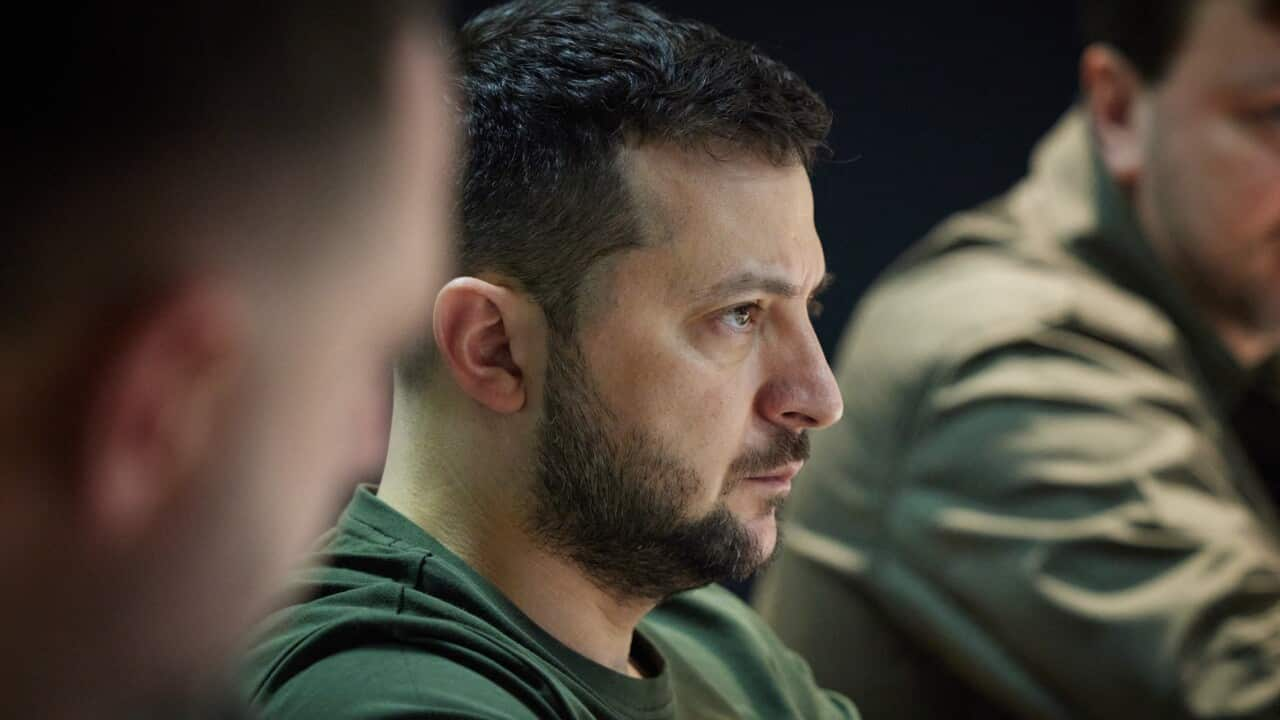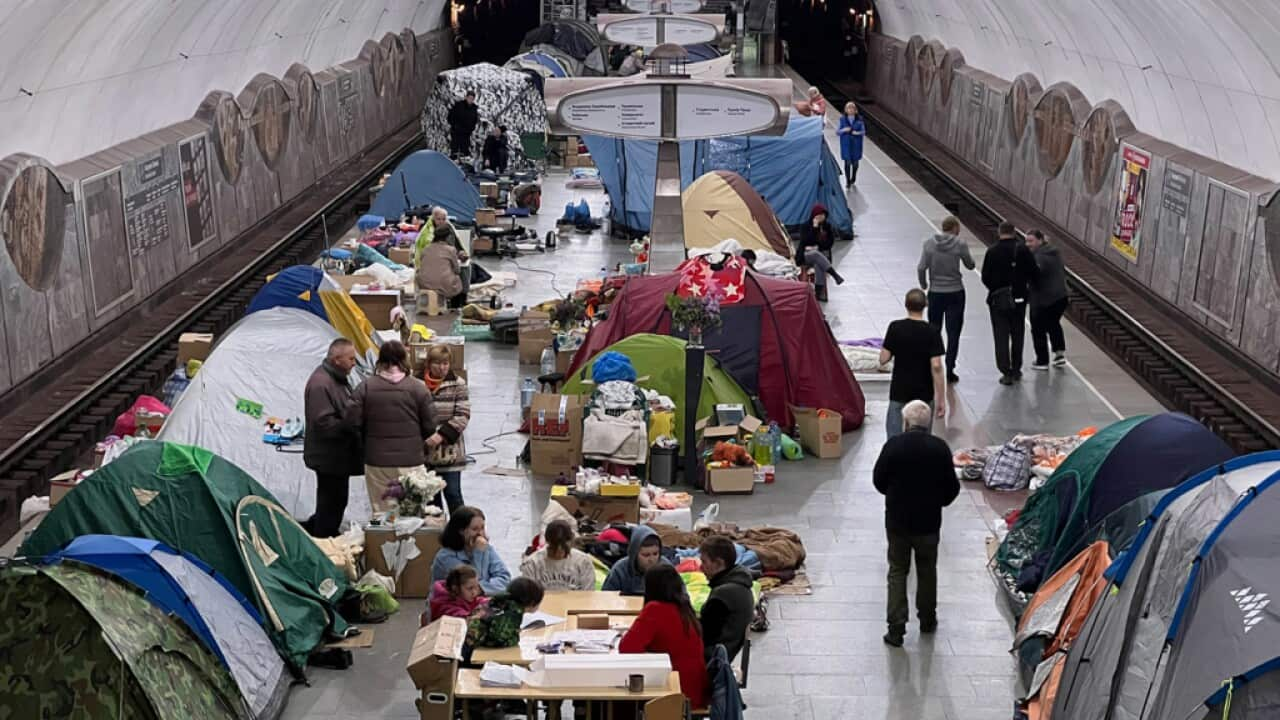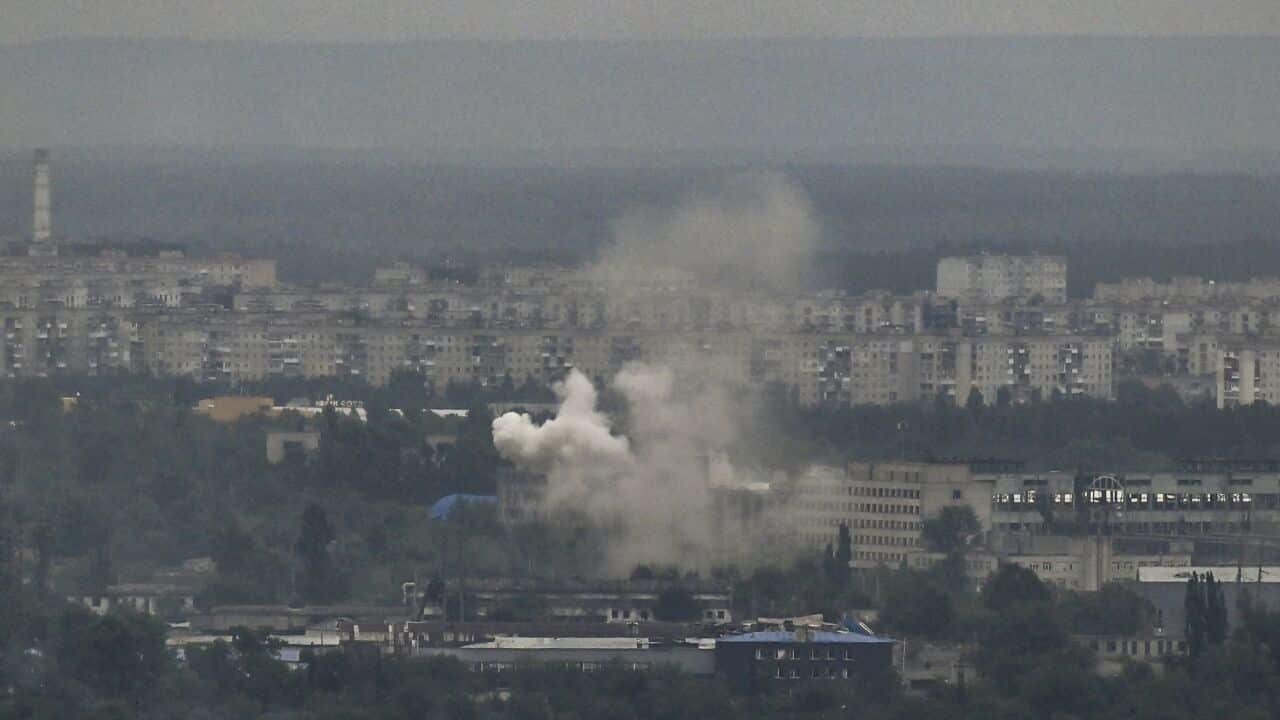Ukrainian forces are suffering painful losses in fighting Russian troops in both the eastern city of Severodonetsk and the Kharkiv region, President Volodymyr Zelenskyy said on Tuesday.
In a late-night address, he also said Ukraine needed modern anti-missile weapons now, adding there could be no justification for partner countries to delay delivery. Some Russian rockets are evading defences and causing casualties, he said.
Ukraine said its forces were still trying to evacuate civilians from Severodonetsk after Russia destroyed the last bridge to the city, the latest stage in a weeks-long battle in the Donbas region that Moscow seeks to capture.
Meanwhile, a six-year-old girl from Dnipro — in central Ukraine — has busked in a bid to raise money for the military by performing . The funds will go towards first aid equipment, bulletproof vests and a drone.
Mr Zelenskyy said intense fighting continues in the strategic city of Severodonetsk and other nearby towns and communities. He described troop losses as "painful"
"But we have to hold strong - holding strong is so critically important in Donbas. The more losses the enemy suffers there the less strength it will have to pursue its aggression," he said.
Ukraine said its forces were still trying to evacuate civilians from embattled Severodonetsk on Tuesday after Russia destroyed the last bridge to the city, Moscow's main target in its battle for control of eastern Ukraine.
Although Severodonetsk's last bridge over the Siverskyi Donets river had been felled, evacuations were still being carried out "every minute when there is a lull and there is a possibility of transportation," Mayor Oleksandr Stryuk said.
"Every possible chance is taken," Mr Stryuk said.
Ukraine says more than 500 civilians are trapped inside Azot, a chemical factory where its forces have resisted weeks of Russian bombardment and assaults that have reduced much of the city to ruins.
Luhansk regional governor Serhiy Gaidai said shelling on Azot was so powerful that "people can no longer stand it in the shelters, their psychological state is on the edge."
Russia said it would give Ukrainian fighters holed up in the chemical plant a chance to surrender on Wednesday morning. Fighters should "stop their senseless resistance and lay down their arms" from 8am Moscow time, said Mikhail Mizintsev, head of Russia's National Defence Management Centre.
Civilians would be let out through a "humanitarian corridor", he said.
Both sides claim to have inflicted huge casualties in the fighting over the city, Russia's principal battleground focus.
Ukraine still holds Lysychansk, Severodonetsk's twin city on higher ground on the western bank of the river. But with all the bridges now cut, its forces acknowledge a threat that they could be encircled in Severodonetsk.
Damien Megrou, spokesperson for a unit of foreign volunteers helping to defend Severodonetsk, said there was a risk of leaving "a large pocket of Ukrainian defenders cut off from the rest of the Ukrainian troops" - as in Mariupol, the Black Sea port that surrendered last month after months of Russian siege.

Svitlana Nazarenko, sister of Mykhailo Tereshchenko, is being comforted by her son during her brother's funeral on 14 June, 2022 in Kyiv, Ukraine. Mykhailo Tereschchenko, 50, was a Ukrainian soldier who was killed in the Ukrainian region of Donbas. Source: Getty / Alexey Furman/Getty Images
'Unbearable'
The battle for Severodonetsk - a city of barely more than 100,000 people before the war - is now the biggest fight in Ukraine as the conflict has shifted into a war of attrition.
Kyiv has said 100-200 of its soldiers are killed each day, with hundreds more wounded.
Russia gives no regular figures of its own losses but Western countries say they have been massive, as Moscow has committed the bulk of its firepower to delivering one of President Vladimir Putin's stated objectives: forcing Kyiv to cede the full territory of two provinces, Luhansk and Donetsk, collectively known as the Donbas.
Momentum in Severodonetsk has shifted several times over the past few weeks - with Russia concentrating its overwhelming artillery firepower on urban districts to obliterate resistance, then sending in ground troops vulnerable to counter-attacks.
Bigger battles could lie ahead for the wider Ukrainian-held pocket of the Donbas, nearly all on the opposite bank of the river which Russian forces have found difficult to cross. Ukraine says Russia plans to assault Sloviansk from the north and along a front near Bakhmut to the south.
Ukraine is also seeing "painful losses" in the Kharkiv region to the east of Kyiv, where Russia is trying to strengthen its position after being pushed back recently, Mr Zelenskyy said. He added: "Battles are continuing there and we have to keep fighting, fighting hard."
In Donetsk province, critical infrastructure including homes, schools, hospitals and markets have been attacked over the past week, United Nations spokesman Stephane Dujarric told reporters in New York.

Photos of Ukrainian soldiers killed during the war seen displayed in a church in Lviv. Source: AAP / SOPA Images/Sipa USA
Ukrainian officials renewed their pleas for the West to send more and better artillery as well as tanks, drones and other heavy weapons.
Deputy Defence Minister Hanna Malyar told a briefing that Ukraine had received only 10 per cent of the arms it needed from its allies.
Western countries have promised NATO-standard weapons - including advanced US rockets. But deploying them is taking time.
"What we don't have enough of are the weapons that really hit the range that we need to reduce the advantage of the Russian Federation's equipment," Mr Zelenskyy told an online press briefing.
Drain troops
Beyond the Donbas, Ukrainian officials hope that Russia's focus on capturing the east will drain its forces from other areas and pave the way for counter-attacks to recapture territory.
Ukraine retook the area around its second-largest city Kharkiv in May and has reported small but steady gains in recent days in the south, the biggest swathe Russia retains of the territory it seized after its invasion in February.
Serhiy Khlan, adviser to the head of the southern, mainly Russian-occupied Kherson province, said Ukraine was having tactical success retaking territory there for a second straight week.
Troops had already advanced 5km from Tavriysk, a town on the south bank of the Dnipro river east of Kherson city, and were gradually advancing, Mr Khlan said.
Reuters was unable to verify any reports from the area.











